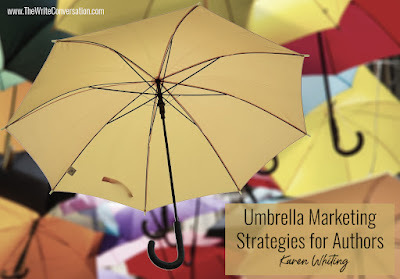Edie Melson's Blog, page 95
March 19, 2023
Umbrella Marketing Strategies for Authors

by Karen Whiting @KarenHWhiting
An umbrella is a covering that includes your main and sub-products. As creatives it’s easy to want to branch out and not stay within one niche. But many times editors and agents want us to have a single brand. Look around at businesses including McDonald’s known for its burgers and Campbells known for soup and note that they also sell many other products but stay tied to the umbrella of fast food or wholesome easy to prepare at home. Thus, they have a core message but branch out in what they sell. They maintain a common thread that pulls the products together. Most such companies started with a main product and then, once established, added other products.
With authors, your core message may be peace or overcoming abandonment, but you may do that through fiction, nonfiction, children’s books, and Christian Living books. For myself, I’m all about helping families thrive. My books include ones for women, children, and families, plus I’m on the team of Tim Mahoney’s documentary and film company that produces documentary feature films for adults and youth films to watch as a family. People quickly understand that my goal is to help families bond to one another and God. It takes the right strategies to promote your umbrella of books.
Build on Your Strengths
One important aspect of umbrella branding is to use the author’s best-known book to help launch others. Pam and Bill Farrel’s book Men are Like Waffles, Women are Like Spaghetti, as her top seller, is a great one to pull out a quote to introduce a new book. She has books Bible studies, so she can use book quotes from that flagship book on faith and studying the Word as a couple. She has books on joy, and can use the book’s quotes about joy to launch those books.
Search your best-seller to find quotes related to the topic or massage of your newer books. You may think, “But I’m switching to a children’s book, so how does that help?” Remember that the parents, especially the mom, still buys the books for children, so those quotes target the buyer. You might add to a post, if your main topic is marriage, “Joy makes a difference in your marriage and can also make a difference for your child.” I used bookmarks for my books for girls that sold so well, and brought some of the ideas in those bookmarks when I wrote a parenting book. The cross promotion with a little connection helps the mom/buyer see your values are the same in your other books.
Segment the Audience
Consider various lines of books as audience segments that provide a unique benefit for that segment. So your audience may be moms, but some may want help with organizing their home and day while others want help communicating with their teens or they may have different aged children. You can use a quiz to divide your audience, and website visitors, according to their needs. Match the products that best suit each audience and create email sequences and messages best suited for each.
The segmenting allows you to email the ones most interested in your next book to receive the first emails about it. Later, as that audience starts to buy, you can tap into the entire email list for a blast where you connect your values that underscores all your books to promote to everyone, and use a quote form a read about the new book.
Know Your Common Thread
Campbell’s uses words like delicious, simple, well-crafted, and foods you love. They build on people trusting their food, so they showcase the nutrition and affordability of the products. They share the benefits continually, and that makes it easier to introduce new products.
Identify the common thread or core message in your writing. If you write fiction and nonfiction, you likely have a core message such as hope, belonging, or family. Be sure to post often about that core message.
If you always bring hope, then use quotes on hope, share from a reader’s perspective how hope you gave helped, and give them tips on hope. Also leader with your best-selling books people know to inspire them to tread other books. Thus, ‘If you love [ABC], you’ll find the same (quality value in that book] in this new book XYZ.
Use Some Visuals
Take photos with your best sellers and your newer books, or divide books if you have a lot, into categories and take a photo. You might even get a rainbow umbrella and write words that tie the books together or add iron on photos of your covers and snap a shot. Use a logo that expresses your values rather than one book. That makes you the brand and helps people associate what they like about your writing that they can expect in any title under your umbrella.
It’s easier to start out with one book, build it up with similar books first, and then branch out as you articulate your umbrella’s core message and share how it flows from your early books.
TWEETABLEUmbrella Marketing Strategies for Authors from author @KarenHWhiting on @EdieMelson (Click to Tweet)
 Karen Whiting (WWW.KARENWHITING.COM) is an international speaker, former television host of Puppets on Parade, certified writing and marketing coach, and award-winning author of twenty-seven books for women, children, and families. Her newest book, The Gift of Bread: Recipes for the Heart and the Table reflects her passion for bread and growing up helping at her grandparent’s restaurant. Check out her newest book Growing a Mother’s Heart: Devotions of Faith, Hope, and Love from Mothers Past, Present, and Future. It's full of heartwarming and teary-eyed stories of moms.
Karen Whiting (WWW.KARENWHITING.COM) is an international speaker, former television host of Puppets on Parade, certified writing and marketing coach, and award-winning author of twenty-seven books for women, children, and families. Her newest book, The Gift of Bread: Recipes for the Heart and the Table reflects her passion for bread and growing up helping at her grandparent’s restaurant. Check out her newest book Growing a Mother’s Heart: Devotions of Faith, Hope, and Love from Mothers Past, Present, and Future. It's full of heartwarming and teary-eyed stories of moms.Karen has a heart to grow tomorrow’s wholesome families today. She has written more than eight hundred articles for more than sixty publications and loves to let creativity splash over the pages of what she writes. She writes for Crosswalk. Connect with Karen on Twitter @KarenHWhiting Pinterest KarenWhiting FB KarenHWhiting.
Published on March 19, 2023 22:00
March 18, 2023
Fun Similarities Between Writers and Cooks

by Tammy Karasek @TickledPinkTam
The writing conference schedule for 2023 is going strong. Some of them have already happened. Writers have registered and secured their hotel rooms and travel plans for those to come. Many choices of writing conferences flood the internet, and there are great ones to choose from.
Beautiful produce is delivered to grocery stores as well as farmers’ markets throughout the area have planned their opening date for spring. The colors and smells are mesmerizing. The choices abound. As a classically-trained-French cook, the joy I get walking through the bounty is probably like the joy my hubby gets as he walks through a chocolate shop! Both of us take our time. We imagine the taste and try to decide what we’ll buy. And buy, we will. Share we must.
What does food have to do with writing?
The cook of the home has many choices about what he or she will cook. Cooks have an abundance of food items to create special meals to be shared with others. Like cooks, we writers have many choices to make as well:What topic will we write about?Will we write fiction or nonfiction?Will we try to be published traditionally or independently?Will we co-write?
Like perusing through the markets and gathering ideas of how to use the various foods which surround us, writers watch and listen to people and actions around us to gather ideas. We become like sponges absorbing the activities and conversations around us.
As a cook mulls over the recipe choices, writers mull over how they will share the thoughts whirling through their minds:Will it be a blog post?Will it be a devotional?Will it be a magazine article?Will it be part of a book?
Once the recipe, or writing piece, has been chosen, it’s time to move to the next step. The prepping or in cooking terms, mise en place (everything in place) is next and necessary in both scenarios. A cook gathers all the ingredients ready to be added at the right time. Writers do their research and place it together to be used when needed.
The cook’s dish has been prepped—now it’s time to let it sit and simmer. The first draft has been composed, time to let the words simmer just like the ingredients of the food; both need to work and take time to have the perfect taste intended.
We know that foods should have a good taste, but can words do the same? I believe so. I think a ripe slice of summer watermelon has a good taste and takes me to a happy place. Kind words can do the same thing through encouragement to your soul. But unkind words can leave a bitterness similar to a piece of unsweet-dark chocolate while it dissolves on your tongue. Words of anger are much like a spicy hot pepper—painful. Both leave a bad memory in your mind.
But there is another type of taste connected to words, and that is through spiritual food:
Taste and see that the Lord is good; Psalm 34:8a NIV
Then Jesus declared, “I am the bread of life. He who comes to me will never go hungry, and he who believes in me will never be thirsty.” John 6:35 NIV
As writers, are we offering up words that direct people to the best taste ever? Do our words point to the Bread that gives life to all who accept it?
The next time we go through a market with all the colorful produce, think about the many ways Jesus can be shared through our words. How boring would the market be if it had row upon row of small red tomatoes. Just like each and every piece of produce we pick up is different and unique in its formation and color, the words we choose can be used to draw someone closer to God.
Will you join me in sharing the abundance and wonderful taste of Jesus to those around us through our written words?
TWEETABLEFun Similarities Between Writers and Cooks from @TickledPinkTam on @EdieMelson (Click to Tweet)
 Tammy Karasek uses humor and wit to bring joy and hope to every aspect in life. Her past, filled with bullying and criticism from family, drives her passion to encourage and inspire others and give them The Reason to smile. She’s gone from down and defeated to living a “Tickled Pink” life as she believes there’s always a giggle wanting to come out!
Tammy Karasek uses humor and wit to bring joy and hope to every aspect in life. Her past, filled with bullying and criticism from family, drives her passion to encourage and inspire others and give them The Reason to smile. She’s gone from down and defeated to living a “Tickled Pink” life as she believes there’s always a giggle wanting to come out! When not writing Rom-Com, she’s The Launch Team Geek helping authors launch their books and also a Virtual Assistant for a couple best-selling authors. Her work was published in a Divine Moments Compilation Book—Cool-inary Moments. She’s also the Social Media Manager for the Blue Ridge Mountains Christian Writers Conference, Founding President and current Vice-President of ACFW Upstate SC, and Founding President of Word Weavers Upstate SC. She’s a writing team member for The Write Conversation Blog, Novel Academy, MBT Monday Devotions, The Write Editing and others. Connect with Tammy at HTTPS://WWW.TAMMYKARASEK.COM.
Published on March 18, 2023 22:00
March 17, 2023
Writing Organically

by MaryAnn Diorio, PhD, MFA @DrMaryAnnDiorio
“Organic” is a big buzzword in the food industry. It means free of pesticides, synthetic chemicals and fertilizers, injected hormones, antibiotics, and other elements that, if misused, may be harmful to human health. In addition, organic foods do not contain genetically modified organisms (GMOs), nor may animals raised organically be cloned.
Surprisingly, the term organic relates to the Christian writing and publishing industry as well. As faithful Christ-Followers, we aim to keep our writing free of anything that would be harmful to the spiritual and moral health of our readers.
With that in mind, we can apply the term organic beautifully to the writing of fictional stories. How are stories organic?
1. Whereas organic crops must be grown with fertilizers free of pesticides, so must our stories be written with a pure heart, free of harmful attitudes, thoughts, and intents and without spiritual compromise.
2. Whereas organic crops cannot be genetically engineered or irradiated with harmful substances, thereby altering their God-given DNA, so must our stories remain true to the Word of God, in no way altering or infiltrating its truth with false teachings.
3. Whereas organically-fed animals must eat only organically-grown feed that is not treated with synthetic hormones or antibiotics, so must we as writers feed only on the Word of God as our sustenance and not allow vain worldly philosophies to influence our minds and hearts and, thereby, our writing.
4. Whereas organically raised animals cannot be cloned, we writers who follow Christ must not allow ourselves to become clones of the world.
5. Whereas organically raised animals must have free access to pastures and the outdoors, so must we writers graze freely in the Lord’s green pastures to feed generously on the Bread of Life.
In the organic food industry, a seal is placed on the food item to indicate that it upholds government requirements and standards for organic food. This seal is the United States Department of Agriculture Organic Seal, aka the USDA seal. It indicates that the food product labeled organic meets the specific standards of an organic food item.
As Christ-Followers, we bear the seal of the Holy Spirit. This seal indicates that the stories we create meet the standards of God’s Holy Word, reflecting His truth and His love in every word.
TWEETABLEWriting Organically from @DrMaryAnnDiorio on @EdieMelson (Click to Tweet)
 MaryAnn Diorio writes women's fiction from a quaint Victorian town in southern New Jersey where the neighbors still stop to chat while walking their dogs, the houses still sport wide, wrap-around porches, and the charming downtown still finds kids licking lollipops and old married couples holding hands.
MaryAnn Diorio writes women's fiction from a quaint Victorian town in southern New Jersey where the neighbors still stop to chat while walking their dogs, the houses still sport wide, wrap-around porches, and the charming downtown still finds kids licking lollipops and old married couples holding hands.A Jersey girl at heart, MaryAnn is a big fan of Jersey diners, Jersey tomatoes, and the Jersey shore. You can learn more about her at maryanndiorio.com.
______________________________
Sources cited:
https://www.foodandwaterwatch.org/2018/07/31/understanding-food-labels-2/
https://www.britannica.com/topic/organic-food
Published on March 17, 2023 22:00
March 16, 2023
More Pronoun Tips for Writers—Auntie Seedent and Uncle Fred

by Crystal Bowman
A while back I posted an article about pesky pronouns and the challenges they can cause writers. Since it turned into a lengthy article, I touched on a few common issues and saved the rest for another time. So, in this article I want to cover something that’s easy to overlook. I cringe when I look back at some of my writing from decades ago and see that I didn’t always get this right!
The antecedent and the pronoun.
When using a pronoun in a sentence, we need to be sure the reader clearly knows who or what the pronoun is referring to (the antecedent). Let’s look at some examples.
Two ladies and a coat.
Sue gave her coat to Jane because she needed a warmer one.
So, who needed the warmer coat—Sue or Jane?
The pronoun she refers to the closest noun, which is the antecedent, so the answer would be Jane. If, however, Sue needed the warmer coat, then this sentence would be incorrect. Instead, it could be written this way:
Sue needed a warmer coat, so she gave hers to Jane.
In this sentence we have two antecedents and two pronouns. She refers to Sue, and the possessive pronoun hers refers to coat. The way this sentence is worded lets the reader know that Sue needed the warmer coat.
Let’s go fishing.
Uncle Fred met John down by the lake. He was excited to go fishing.
Who was excited to go fishing, Uncle Fred or John? In this sentence John would be the antecedent, so he is the excited fisherman. But what if Uncle Fred was the one who was eager to fish? Then it would be written this way:
Uncle Fred was excited to go fishing. He met John down by the lake.
If they were both excited to go fishing, then you would write this with a compound antecedent and plural pronoun:
Uncle Fred met John down by the lake. They were excited to go fishing.
He, him, ho-hum.
If the antecedent doesn’t change, you can continue to use the same pronoun as long as it doesn’t become redundant.
George went hiking by himself. He saw three deer and two coyotes. He was careful to be quiet so the animals wouldn’t notice him. After a few hours, he walked back to his campsite. He crawled into his sleeping bag and fell asleep.
Though we don’t need to use George’s name more than once to clarify the pronoun, using he repeatedly makes the text boring and minimizes the character. A good place to use George’s name again would be in the second-to-last sentence.
After a few hours, George walked back to his campsite. He crawled into his sleeping bag and fell asleep.
Pronoun: antecedent agreement.
A singular antecedent needs a singular pronoun.
My mom walks every day so she can get enough exercise.
A plural antecedent needs a plural pronoun.
The children heard the ice cream truck, so they ran outside.
If the gender of the antecedent is unknown, the pronoun can be they (says CMoS).
If the driver can’t come tonight, they will come in the morning.
Which comes first?
The antecedent doesn’t always need to precede the pronoun. To vary your sentences, the antecedent can follow the pronoun, but then it’s technically a postcedent.
When it was her turn to speak, Mary stood up and spoke with confidence.
It was a scary night for him, but Ben managed to stay calm.
Common nouns.
When singular common nouns are used, the pronoun is it.
The basketball game was exciting. It went into overtime, and we finally won!
When using a compound antecedent with common nouns, using a pronoun could be confusing. For example:
The protest march and speeches caused chaos in the streets. They made people feel unsafe.
Does they refer to the march and speeches, chaos, or streets?
To clarify the sentence, a noun phrase can be used instead of a pronoun.
The protest march and speeches caused chaos in the streets. These events made people feel unsafe.
Clarity is the key for writers.
As professional writers, we want our writing to be engaging and interesting. We want to dazzle our readers as we carefully and creatively string words together. But as we stive to accomplish this, we need to remember that clarity for the reader is always an important goal. Afterall, we want Auntie Seedent and Uncle Fred to understand who needs the warmer coat and who wants to go fishing.
TWEETABLEMore Pronoun Tips for Writers—Auntie Seedent and Uncle Fred from author Crystal Bowman on @EdieMelson (Click to Tweet)
 Crystal Bowman is an award-winning, bestselling author of more than 100 books for children and four nonfiction books for women. She also writes lyrics for children’s piano music and is a monthly contributor to Clubhouse Jr. Magazine. She loves going to schools to teach kids about poetry. She also speaks at MOPS (Mothers of Preschoolers) groups and teaches workshops at writers’ conferences. When she is not writing or speaking, she enjoys going for walks, working out at the gym, and eating ice cream. She and her husband live in Michigan and have seven huggable grandkids.
Crystal Bowman is an award-winning, bestselling author of more than 100 books for children and four nonfiction books for women. She also writes lyrics for children’s piano music and is a monthly contributor to Clubhouse Jr. Magazine. She loves going to schools to teach kids about poetry. She also speaks at MOPS (Mothers of Preschoolers) groups and teaches workshops at writers’ conferences. When she is not writing or speaking, she enjoys going for walks, working out at the gym, and eating ice cream. She and her husband live in Michigan and have seven huggable grandkids. WWW.CRYSTALBOWMAN.COMWWW.FACEBOOK.COM/CRYSTAL.BOWMANWWW.FACEBOOK.COM/CRYSTALJBOWMANWWW.INSTAGRAM.COM/CRYSTALBOWMANAUTHOR
Published on March 16, 2023 22:00
March 15, 2023
How Writers Can Generate Revenue from Their Email List

by Susan U. Neal RN, MBA, MHS @SusanNealYoga
Do you have an email list yet? A large email list is crucial to your business. If you need help with getting your email list started, please see the blog, Tips for Optimal Email Marketing That Will Engage Readers & Grow Your Email List. After you established a sizable email list, it’s time to earn revenue from it.
We need to support our publishing ministry financially to keep our business viable.
3 ways to monetize a newsletter or email automation include:
1. Sell your products and services.
2. Sell affiliate products and services.
3. Find newsletter sponsors to pay you.
Your newsletter or email automation must provide value, fun, and relevant information to your readers. When it does, readers will stay on your list. The more subscribers you have, the more profitable your list will be.
Offer Your Products and Services
However, you don’t want to hit up your subscribers with frequent offers. How often should you include an offer in your newsletter? Use Edie Melson’s five to one rule for social media. Give your subscriber five benefits before providing them with one of your offers. You want your reader to keep opening your emails, so you have to give them value. If you send a weekly newsletter provide one offer per month. If you send a newsletter twice a month, have one offer every two months. You always want to provide more value than your number of buy offers so the reader will continue to open your emails. If they know, like, and trust you, then they will buy from you.
If you would like to know more about how to establish a large email list, how often to send an email, and the secret to opt-in gifts, please see my Course: Optimal Email Marketing from Opt-In Gift to Email Automation at CIPA.Podia.com.
Newsletter Sponsor
A newsletter sponsorship is a paid advertisement in your email. But you can easily incorporate this advertisement into the reader experience. In fact, you can include content in your newsletter that blends well with your sponsor’s product. For example, a blog about toxins in the water works well with a water purification advertisement or an affiliate link. This ad helps the reader know where to go to get the product they desire. You can include newsletter sponsorships at any time. Add them to the bottom of your email or wherever you want in your newsletter. You could say this newsletter is brought to you by …
To get started with finding a sponsor, create a media kit to include along with your pitch email to give to sponsors. You can grab your free media kit guide at https://christianpublishers.net/free-gift/.
You need to acquire 10,000 subscribers on your email list before you go after sponsorships. For example, convert kit is a great program to become an affiliate with, but they require 10,000 people on your email list to be a sponsor.
Before working on sponsors, focus on setting up at least one big ticket affiliate program, next focus on selling your own products and services, and finally after you have 10,000 on your email list seek monetary sponsorship.
Affiliate Offers
An affiliate program is an arrangement where a company will pay you a commission for finding buyers. You sign up for the affiliation with the company and they give you a specific link to use to sell their product. This special link lets the company know that you found the buyer. You can post affiliate links in blogs, your website, or a newsletter.
Find several affiliate programs you could incorporate into your newsletter and plan on creating emails for the affiliate offer. You want to make sure these affiliate programs are in alignment with your core values and brand. For example, as an a author coach teaching about email marketing, I’ve become an affiliate for Active Campaign and ConvertKit (here is my affiliate link).
For purchase links, a 1 percent purchase rate is typical. So if you have 100 people on your list you can expect one person to buy your offer. If you find an affiliate program you can make $100 from one sale, if you have 1000 people on your email list you could expect 10 buyers, which would provide you with $1000. Not bad, huh?
If you don’t have .5 to 1 percent of your subscribers taking you up on your offers, then the offer may not be a good match for the audience. So you have to figure out what your audience likes. Test your offers in your emails to see if they work. Try different subject lines and formats for the newsletter offer.
Try to find affiliate programs where you make at least $100 from one sale. This makes it much more worthwhile than $10. For example, affiliate courses usually pay a 30 to 50 percent commission for the sale. So the course would need to be valued at several hundred dollars for it to be worthwhile.
When you say yes to one affiliate offer, you are saying no to another one. So make sure your affiliate offers are big dollar makers for you. This is how you monetize your newsletter.
In the fall, you could create a gift guide for your subscribers that includes links to all of your affiliate products. You can include lower price items with an affiliate link from Amazon on this guide. Send the gift-buying guide in early November when most people buy Christmas gifts.
How do you introduce an offer in your email? You tell them how it affected you and improved your life since you use the product. In the email you can also add, “If this offer is not for you, maybe you would like this freebie.” So you are giving them something besides the offer. The freebie made it worthwhile for them to open the email.
When you send an affiliate email offer, you usually send three emails about it. The first one includes general information about the offer. The second one lists everything they will receive from the offer and includes how long this offer is open. It’s also great to say, “If you have questions about this offer please reply to this email, and I would be happy to answer them.” In the third email, the subject line should say, Last Day of Sale. Sending three emails within one week is acceptable.
Next Steps
To get started with monetizing your email list, here are your next steps.Create a couple of emails in your automation which highlight your books, coaching, and courses.Create a list of potential affiliate products. Determine which affiliate to use and sign up. Incorporate affiliate links into your email automation.
For more information about email marketing and monetization, please check out my Course: Email Marketing at CIPA.Podia.com. May God bless your journey to financially support your ministry.
TWEETABLEHow Writers Can Generate Revenue from Their Email List from author @SusanNealYoga on @EdieMelson (Click to Tweet)
 Susan U. Neal, RN, MBA, MHS: Susan’s mission is to improve the health of the body of Christ. She has her RN and MBA degrees, as well as a master’s in health science. She is a CERTIFIED HEALTH AND WELLNESS COACHwith the American Association of Christian Counselors. She published five books, the Selah award winner 7 STEPS TO GET OFF SUGAR AND CARBOHYDRATES, CHRISTIAN STUDY GUIDE FOR 7 STEPS TO GET OFF SUGAR AND CARBOHYDRATES, HEALTHY LIVING JOURNAL, SCRIPTURE YOGAa #1 Amazon best-selling yoga book, and YOGA FOR BEGINNERSwhich ranked #3. She published two sets of Christian Yoga Card Decks and two Christian Yoga DVDs that are available at CHRISTINAYOGA.COM. Her digital product HOW TO PREVENT, IMPROVE, AND REVERSE ALZHEIMER’S AND DEMENTIA is a great resource. To learn more about Susan visit her website SUSANUNEAL.COM You can also connect with Susan on FACEBOOK, TWITTER, and INSTAGRAM.
Susan U. Neal, RN, MBA, MHS: Susan’s mission is to improve the health of the body of Christ. She has her RN and MBA degrees, as well as a master’s in health science. She is a CERTIFIED HEALTH AND WELLNESS COACHwith the American Association of Christian Counselors. She published five books, the Selah award winner 7 STEPS TO GET OFF SUGAR AND CARBOHYDRATES, CHRISTIAN STUDY GUIDE FOR 7 STEPS TO GET OFF SUGAR AND CARBOHYDRATES, HEALTHY LIVING JOURNAL, SCRIPTURE YOGAa #1 Amazon best-selling yoga book, and YOGA FOR BEGINNERSwhich ranked #3. She published two sets of Christian Yoga Card Decks and two Christian Yoga DVDs that are available at CHRISTINAYOGA.COM. Her digital product HOW TO PREVENT, IMPROVE, AND REVERSE ALZHEIMER’S AND DEMENTIA is a great resource. To learn more about Susan visit her website SUSANUNEAL.COM You can also connect with Susan on FACEBOOK, TWITTER, and INSTAGRAM.Featured Image: Photo by Priscilla Du Preez on Unsplash
Published on March 15, 2023 22:00
March 14, 2023
Are You Recruiting the Best Words When You Write?

by Katy Kauffman @KatyKauffman28
How careful are you with the words you choose?
Stir up or incite? Weaken or languish? Move or sway? When you consider which word to write next, do you also consider the power behind the word? How it sounds to the reader’s inner ear? What picture it portrays?
You are more than just a writer of words—you are a recruiter as well.
Our words are our allies. They prove our point, illustrate our thoughts, and fight our battles. Are you seeking to vanquish hopelessness in the minds of your readers? Choose your words carefully. Are you illustrating a story of redemption and second chances? Pick your allies wisely.
A limp word fights against your purposes, acting as a weak soldier in your ranks. Not every word needs to wear shiny armor, but your army of paragraphs and sentences should be filled with vivid nouns and verbs that relay your message and fight against the evils and lies of this world. They should engrave truth, strength, and hope onto the souls of your readers. How effective is your army?
Another Ally
Rarely does a first draft pop out of our minds filled with just the right words. Using a red pen (or another color) helps us to identify any weak points in our writing, and reinforces our chances of being published and making an impact on the readers’ minds and hearts.
If a red pen looks more like an enemy than a friend, it’s okay to pick another color. Once you’ve written a first draft, read your writing and use a colored pen or pencil to circle any words in your paragraphs that appear limp instead of battle ready. To the side of that line of words, jot down some alternative “soldiers,” words that better illustrate what you want to say or convey a stronger feeling you want the reader to experience.
Becoming Battle Ready
If you’re like me and you reach a point in your writing where you just don’t know what words to use, check out some books or articles by other “generals.” Read your favorite authors, and see what words they recruited to capture the readers’ attention, prove their points, and etch a lasting impression on their readers’ hearts.
Don’t let vivid nouns and verbs take position in only your titles and first lines. Position them throughout your paragraphs to maintain the power behind your words, either helping the reader to fly through a page or causing them to slow down and contemplate your writing.
One last thing. I’ve found it’s never best to fight alone. I treasure the writer friends who have helped my words become more battle ready. Ask another recruiter to size up the power and punch of your words, and take to heart any helpful feedback that is given. Recruit the nouns and verbs that deliver just the right touch or the perfect punch.
What strategies do you use in picking the best words? Share your thoughts in the comments below, and happy recruiting. One vivid word after another.
TWEETABLEAre You Recruiting the Best Words When You Write? from @KatyKauffman on @EdieMelson (Click to Tweet)
 Katy Kauffman is an award-winning author, an editor of Refresh Bible Study Magazine, and a co-founder of LIGHTHOUSE BIBLE STUDIES. She loves connecting with writers and working alongside them in compilations, such as Feed Your Soul with the Word of God, Collection 1 which is a 2020 Selah Awards finalist. She also enjoys encouraging writers and giving writing tips in her monthly writers’ newsletter called THE LIGHTHOUSE CONNECTION.
Katy Kauffman is an award-winning author, an editor of Refresh Bible Study Magazine, and a co-founder of LIGHTHOUSE BIBLE STUDIES. She loves connecting with writers and working alongside them in compilations, such as Feed Your Soul with the Word of God, Collection 1 which is a 2020 Selah Awards finalist. She also enjoys encouraging writers and giving writing tips in her monthly writers’ newsletter called THE LIGHTHOUSE CONNECTION.In addition to online magazines, Katy’s writing can be found at CBN.COM, thoughts-about-God.com, and three blogs on writing. She loves to spend time with family and friends, create art and make crafts with her group MY ARTSY TRIBE, and tend the garden in the morning sun. She makes her home in a cozy suburb of Atlanta, Georgia. Connect with her on FACEBOOK and TWITTER.
Published on March 14, 2023 22:00
March 13, 2023
The Best Advice EVER for a Writer

by Cindy K. Sproles @CindyDevoted
Though writing about a different conference on the Blue Ridge Mountains Christian Writers Conference blog seems odd, I deemed it valuable. We just finished the Asheville Christian Writers Conference, and during that conference, we did something we normally don’t do—we did a faculty panel.
During this panel, we discussed the proper time to begin the search for an agent and the most important thing to begin with social media. But I think the most crucial information we gleaned came from Lynette Eason .
If you don’t know the wonderful Lynette Eason, pay attention because as a Christian writer, Lynette has hit over one million books sold with her current publisher, and that doesn’t include the Love Inspired books, which roll over that number a couple of times more. She is a tremendous writer. The question we asked Lynette was, how does an author hit one million plus books sold?
She blushed, paused, and then gave this simple bit of advice. “Just keep writing.” Three words that may not seem like much, but they are oh, so valuable. Just keep writing.
The more I thought about Lynette’s answer, the more I realized the problem many writers hit. They write one book. Perhaps that book doesn’t sell, so they keep pushing it year after year. In essence, writers get stuck on “the one,” and they forget the importance of giving it the old school try and moving past.
Don’t misunderstand. Maybe you only have one book in you…but the truth is—maybe that’s just what YOU think. Not what God has planned.
Writing is a process—a craft that must be learned and honed. Rarely does one wake up one morning to be a best-selling author. It takes work. It takes doing it over and over again.
It’s important to do your best. That is what God requires of you—to be obedient and write and to do your best work, but our best work needs honing. If we write only one and stop there, beating a dead horse, we do not learn nor excel to our best.
I have found over the years that sometimes that “one book” I felt God called me to write was really just for me. Years ago, my first effort was a book entitled, What Will Happen If I Die?—Questions Asked and Lived by Parents of Disabled Children.
The book got attention, but the truth was, it wasn’t ready for publication, and as I continued to work on it, I realized it was really meant for me. It was those things I, as a parent of a disabled child, had to ask and then come to grips with the answer. Perhaps someday I will rewrite the book, but the point is, had I chosen never to move past and, as Lynette said, “keep writing,” I would have never attained even one published work, much less eleven.
Write the book. Work hard to make it your best, but don’t stall on the one. Move to the next, and the next, and the next…until finally, the right one hits. When that happens, you will be surprised how, if you keep writing your best, you will keep publishing.
I have sat across the table from conferees who pitch me the same book year after year. When I ask, have you written anything else? Their answer is no. “This is the book God told me to write.” I never underestimate God’s ability to inspire us. I do, however, question our interpretations. God may inspire us to write a particular book, but it may be—just like in my case, a book meant only for me.
Years ago, I gained some critical advice from the amazing Alton Gansky. He said,
“If you want to write for God, then it’s important to understand that your words may not be meant to be on bookstore shelves. They may only be meant for the person sitting next to you. And when you can grasp that, then God can truly work through you as a writer.”
Wow, and wow! I realize many of you will argue with me over this thought, but all I am asking you to do is talk to God about your work. If you’ve been sitting on the same work for several years, are you listening fully to the words given to you by the Father or are you taking His inspiration and placing your desires into it? Could this first work only be the beginning, and you aren’t looking past that?
Lynette is right. Just keep writing—one after the other, after the other. Not only will you learn to be a fantastic writer, but the work will pay off in the long run. You may not sell one million books, but you can become the writer God has called you to be by continually moving. Continually writing.
Wise words from two multi-talented, multi-published authors in this industry, Lynette Eason and Alton Gansky—take heed. There is nothing wrong with working on a piece to make it good, but it is vitally important that every writer stuck on “the one” look seriously at the long-term result. Are you willing to sit on one piece, or will you learn all you can from it and then apply that knowledge to the next and the next? Don’t let your dream of being a writer become the stumbling block to being a successful writer. You are called as a writer by God. He has placed within you the passion and desire. Practice. Learn. Write. Then do it again and again.
TWEETABLEThe Best Advice EVER for a Writer from @CindyDevoted on @EdieMelson (Click to Tweet)
 Cindy K. Sproles is an author, speaker, and conference teacher. Having served for a number of years as a managing editor for Lighthouse Publishing of the Carolinas and Ironstream Media, Cindy now works as a mentor, coach, and freelance editor. She is the co-founder of Writing Right Author Mentoring Services with Lori Marett and she is the director of the Asheville Christian Writers Conference. Cindy is also the co-founder of Christian Devotions Ministries and WWW.CHRISTIANDEVOTIONS.US, as well as WWW.INSPIREAFIRE.COM. Her devotions are in newspapers and magazines nationwide, and her novels have become award-winning best-selling works. She is a popular speaker at conferences and a natural encourager. Cindy is a mountain girl, born and raised in the Appalachian mountains, where she and her husband still reside. She has raised four sons and now resorts to raising chickens where the pecking order is easier to manage. You can visit Cindy at WWW.CINDYSPROLES.COM or www.wramsforwriters.com.
Cindy K. Sproles is an author, speaker, and conference teacher. Having served for a number of years as a managing editor for Lighthouse Publishing of the Carolinas and Ironstream Media, Cindy now works as a mentor, coach, and freelance editor. She is the co-founder of Writing Right Author Mentoring Services with Lori Marett and she is the director of the Asheville Christian Writers Conference. Cindy is also the co-founder of Christian Devotions Ministries and WWW.CHRISTIANDEVOTIONS.US, as well as WWW.INSPIREAFIRE.COM. Her devotions are in newspapers and magazines nationwide, and her novels have become award-winning best-selling works. She is a popular speaker at conferences and a natural encourager. Cindy is a mountain girl, born and raised in the Appalachian mountains, where she and her husband still reside. She has raised four sons and now resorts to raising chickens where the pecking order is easier to manage. You can visit Cindy at WWW.CINDYSPROLES.COM or www.wramsforwriters.com.
Published on March 13, 2023 22:00
March 12, 2023
Four Steps to Advance Your Writing Career

by Lilka Raphael @Lilka_Raphael
The journey of a writer is rarely a sprint to success. Instead, it is most often the culmination of steps along the way. With each step taken, we learn more and eventually gain the courage and confidence to step boldly to obtain our goals. My journey began out of curiosity about blogging and progressed to self-publishing. I’m now working on proposals to submit to agents and editors. What was once terrifying to me, I now view as a professional progression. I’ve compiled four steps that have allowed me to persevere and grow as a writer.
Take a class.
Creative Writing classes are often the first classes curious writers explore. Unlike myself, you may be so gifted and talented that you may not see the need for one. However, I have found that coming together with like-minded people is invigorating. Grammar, mechanics, and editing classes may also be helpful and are available online. These classes taught me how to organize and refine my work.
If you don’t see a need for these courses, you may benefit from a class on the business of writing. Writing is a business. If you want to gain revenue from your efforts, you will need to learn the ins and outs of publishing. From blogs to New York Times bestsellers, many steps along the way allow opportunities to monetize your writing. Even if you desire to self-publish, you must learn how to manage that process and determine which kind of self-publishing model is appropriate for you.
Attend a conference.
This does expound on the first step, yet the benefits are exponential. Most conferences offer courses geared toward first-time writers to advanced marketing techniques for professional authors. Writers’ conferences also provide insight into writing venues and opportunities you may know nothing about. One of the things I learned last year at the Blue Ridge Mountain Christian Writers Conference (BRMCWC) was the amount of income possible through writing articles. I’d never considered article writing, even though I read dozens of them daily. Online publishing is an ever-expanding stream of opportunity.
Conferences also offer insight into other elements of writing vital to success such as social media and platforms. Having a good understanding of these things and how to implement them determines who sees your words. Edie’s class on social media challenged me to define my writing. Who is my audience? What is the end goal? Is it make money or fulfill God’s purpose?
I was fortunate to attend the Asheville Christian Writers Conference in February. I listened to successful authors who were humble and kind enough to recount their trials and frustrations as they forged their paths. My years of attending the Atlanta Writers Conference prepped me for my first huge conference—the BRMCWC. It takes place at the end of May and was unlike any other conference I’d attended.
The scope and scale were immense. I laughed, worshipped, and met new friends. I also connected with mentors that continue to guide me today. These individuals gave me insight into how to promote my work and gain more experience and exposure. Their honest assessment of my submission taught me to rethink and revise, as necessary. This alludes to the third step required to advance your writing, critique.
Open Yourself to Critique
Writers’ conferences offer safe, honest feedback about your work. Your family and friends may rave, but having professionals evaluate it based on their publishing experience is priceless. The modest fee charged for critiques by most conferences will confirm that you have a viable idea and let you know if your writing is marketable.
Years ago, attending a conference was intimidating. I would nervously await each critique when I finally got up the nerve to reveal what I had written. Now, I’m eager for the dialogue. The courage to show someone what you’ve written is critical to improving your writing. The one-on-one time with published authors, agents, and editors that critique as faculty members are great networking opportunities.
Connect with Writers
As a die-hard introvert, I can attest that the relationships I’ve made with other writers have helped me immensely. Not only is it enjoyable to talk to people who get what you do, but accountability partners keep me on task and help me meet my goals. The authors, agents, promoters, and editors I’ve met allowed me accessibility to them I would not have otherwise. Most faculty will review your submitted work faster if you connect with them at a conference. Networking with other authors is vital for an unbiased critique of your work.
If you can’t attend a conference to have your work reviewed, try a critique group. Word Weavers International has chapters practically everywhere. Your local writer’s club is also a great avenue to connect with other authors and join a critique group that will motivate you to keep writing.
Most of us have next steps regardless of where we are on our journey. As we develop our skills, we may go from sporadically publishing articles to writing a commercial bestseller. Some of us may eventually teach the next generation of writers. The craft of writing entails so much more than striking the keys on the keyboard. The business of writing is an ongoing process, and we must consistently develop to reach our audience.
TWEETABLEFour Steps to Advance Your Writing Career from author @Lilka_Raphael on @EdieMelson (Click to Tweet)
 A Florida native, Lilka Raphael has been a licensed pharmacist for over thirty years. Yet, she has learned that the most potent prescriptions are not in bottles. Prayer and persistence are far more effective than any medication she has ever dispensed. Lilka combines her passions for writing, gardening, and photography on her blog, B is for Blessed on WordPress and at lilkaraphael.com.
A Florida native, Lilka Raphael has been a licensed pharmacist for over thirty years. Yet, she has learned that the most potent prescriptions are not in bottles. Prayer and persistence are far more effective than any medication she has ever dispensed. Lilka combines her passions for writing, gardening, and photography on her blog, B is for Blessed on WordPress and at lilkaraphael.com.Married thirty years, Lilka and her husband share their abode east of Atlanta with two German Shepherds—Holly and Ivy—and one naughty kitty, Moxie.
Published on March 12, 2023 22:00
March 11, 2023
The Right Spiritual Documents for the Writer

Martin Wiles @LinesFromGod
Neither my wife nor I had ever been on a cruise. My wife had always wanted to take one. Me? Not so much. You see, water and I have a love-hate relationship. I don’t mind it when it comes to washing my hands or taking a shower, but beyond that, I’m not interested in such things as swimming or boating. At nine, I almost drowned in a friend’s swimming pool. And had it not been for another friend, I would have.
But back to the cruise. Since COVID, cruises—along with almost everything else—have changed. Like flying, security is tight, and one must have the right documents. Unfortunately, our passports had expired several years before. So, we chose the Real ID and birth certificate route to avoid paying the passport expense again. Although a little easier and quicker, this route entailed taking the correct documents to the local Department of Motor Vehicles and paying $25 each for what looked like a regular driver’s license but carried more privileges.
Then came the day of the cruise, and we hoped we had everything we needed. My wife researched the information and talked with those who had cruised before. When we arrived, we made our way to the designated station—after passing through security, of course—and presented our documents. Thankfully, they sufficed.
Next, the attendant issued our boarding passes, which, from then on, became the proper documents. We could put the others away.
Just as we need the right documents for a cruise, we need the right documents for our spiritual journey. Paul mentions two: grace and faith (belief). God extends the first, and we do the second.
“God saved you by his grace when you believed. And you can’t take credit for this; it is a gift from God” (Ephesians 2:8 NLT).
My wife nor I could have worked to get on the ship. We simply had to obey the rules made by others and bring the proper documents.
Like it or not, the same holds in our writing life. Success in our writing world—however we define it—does not happen automatically.
Writers need a few essential documents.
1. Correct Connections
I never cared much for brown-nosers in the work world—those who tried to get ahead by hanging around with the right people—but they had one thing right: we need connections. Writing is, at the same time, a solo act and a social act. We write in isolation, but our writing will not go far without help from others—critique partners, writing groups, editors, friends, supporters, God. Joining a writing group or attending at least one writing conference each year is a good place to begin.
2. Accepting Attitude
We waste our time by making connections if we’re not open to suggestions. “Every editor needs an editor” is a common saying among editors, but every writer also needs an editor—professional or otherwise, depending on what we are doing with our work—and we need other writers. Thinking our writing is perfect will lead us to many dead ends in the writing world and publishing industry.
3. Cultivated Craft
In addition to teaching English five days weekly, I am a freelance editor and writer. But I don’t know everything—and I’m smart enough to admit it. I subscribe to websites that offer insights on writing and editing, and I read books about the writing and editing craft. No one reaches perfection in writing or editing, regardless of how long they have done it, especially when the writing, editing, and publishing worlds change constantly. We all need to find ways to cultivate our craft.
So, wherever you are in your writing journey, don’t sell yourself short. Make sure you have the right documents for your write.
TWEETABLEThe Right Spiritual Documents for the Writer from Martin Wiles, @LinesFromGod on @EdieMelson (Click to Tweet)
 Martin Wiles is the founder of Love Lines from God (WWW.LOVELINESFROMGOD.COM) and serves as Managing Editor for Christian Devotions and Directing Editor for VineWords. He has authored six books and has been published in numerous publications. His most recent book, DON'T JUST LIVE...REALLY LIVE, debuted in October of 2021. He is a freelance editor, English teacher, author, and pastor.
Martin Wiles is the founder of Love Lines from God (WWW.LOVELINESFROMGOD.COM) and serves as Managing Editor for Christian Devotions and Directing Editor for VineWords. He has authored six books and has been published in numerous publications. His most recent book, DON'T JUST LIVE...REALLY LIVE, debuted in October of 2021. He is a freelance editor, English teacher, author, and pastor.Featured Image: Photo by Timothy Eberly on Unsplash
Published on March 11, 2023 22:00
March 10, 2023
Thoughts on Letting Go of Writing Grudges

by Beth Vogt @BethVogt
My husband Rob and I started watching a new cooking show called “Superchef Grudge Match”. Two professional chefs compete to “settle personal and professional disputes with their foes in a one round, one dish, winner-takes-all heavyweight battle.”
I enjoy a good cooking competition, but I’m ambivalent about this show, y’all. Grudges? I can’t get behind those—especially when they’re played out on national TV.
Believe me when I say the opponents play up the grudge angle. Serious smack talk goes down between the two chefs before and during the competition. They throw down not only their best dish during the allotted half hour, but also a prized knife, which is a big deal for a chef.
The winner of the cooking clash walks away with $10,000, bragging rights, and the losing chef’s knife. At the end, handshakes and kind words are exchanged. Grudge gone, right?
I hope so. I really do.
The writing world is built on relationships. We connect with other writers at conferences, as well as editors and agents. Odds are, there will come a time when we’re hurt or offended by something someone says or does. It could be an incidental interaction—or the wound could come from a longtime friend or a trusted ally in our writing journey.
How do we handle the pain so it doesn’t become a grudge? Consider Matthew 18:15 (ESV): “If your brother sins against you, go and tell him his fault, between you and him alone. If he listens to you, you have gained a brother.
The word “sins” means, among other things, misses the mark. This person made a mistake in how they treated you. Maybe they gossiped. Or they insulted your work. In the simplest terms, they weren’t considerate of your feelings. The words for “tell him his fault” means to bring to light or to demand an explanation. It’s vital not to overlook the phrase “between you and him alone.”
The most important step is to go to the other person who hurt us, who offended us, and try to talk things out. All too often, we skip this step. Instead, we go to other people—family members, friends, other writing colleagues—and talk out our grievance with someone with other people. All this does is stir up our emotions, while adding fuel to our offense.
I’ve also learned it’s important to adopt a quiet, humble attitude when I talk with someone else. It’s right, i.e., biblical, to ask for an explanation, but the conversation at least starts better when I treat someone with respect (Philippians 2:3), even if the outcome isn’t always what I’d hoped for.
Another key? Prayer. I always cover any difficult conversation with prayer, as well asking a few trusted friends to pray for me while I’m meeting with the other person.
As writers, we want to build community, not tear down one another. We won’t be best friends with everyone we meet, but we can treat one another with kindness. We can also strive to do the right thing when we recognize there’s a need to repair a relationship with another writer.
TWEETABLEThoughts on Letting Go of Writing Grudges from author @BethVogt on @EdieMelson (Click to Tweet)
 Beth K. Vogt believes God’s best often waits behind the doors marked “Never.” She’s authored 14 novels and novellas, both romance and women’s fiction. Beth is a Christy Award winner, an ACFW Carol Award winner, and a RITA® finalist. Her novel Things I Never Told You, book one in her Thatcher Sisters Series by Tyndale House Publishers, won the 2109 AWSA Golden Scroll Award for Contemporary Novel of the Year. An established magazine writer and former editor of the leadership magazine for MOPS International, Beth blogs for Learn How to Write a Novel and The Write Conversation and also enjoys speaking to writers group and mentoring other writers. She lives in Colorado with her husband Rob, who has adjusted to discussing the lives of imaginary people. Connect with Beth at bethvogt.com.
Beth K. Vogt believes God’s best often waits behind the doors marked “Never.” She’s authored 14 novels and novellas, both romance and women’s fiction. Beth is a Christy Award winner, an ACFW Carol Award winner, and a RITA® finalist. Her novel Things I Never Told You, book one in her Thatcher Sisters Series by Tyndale House Publishers, won the 2109 AWSA Golden Scroll Award for Contemporary Novel of the Year. An established magazine writer and former editor of the leadership magazine for MOPS International, Beth blogs for Learn How to Write a Novel and The Write Conversation and also enjoys speaking to writers group and mentoring other writers. She lives in Colorado with her husband Rob, who has adjusted to discussing the lives of imaginary people. Connect with Beth at bethvogt.com.
Published on March 10, 2023 22:00



